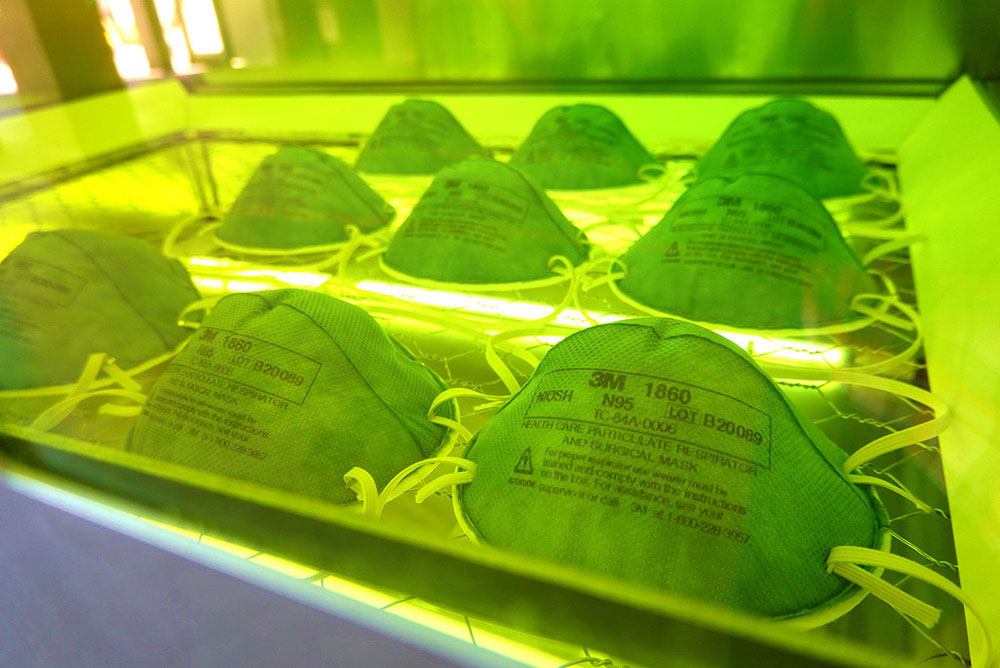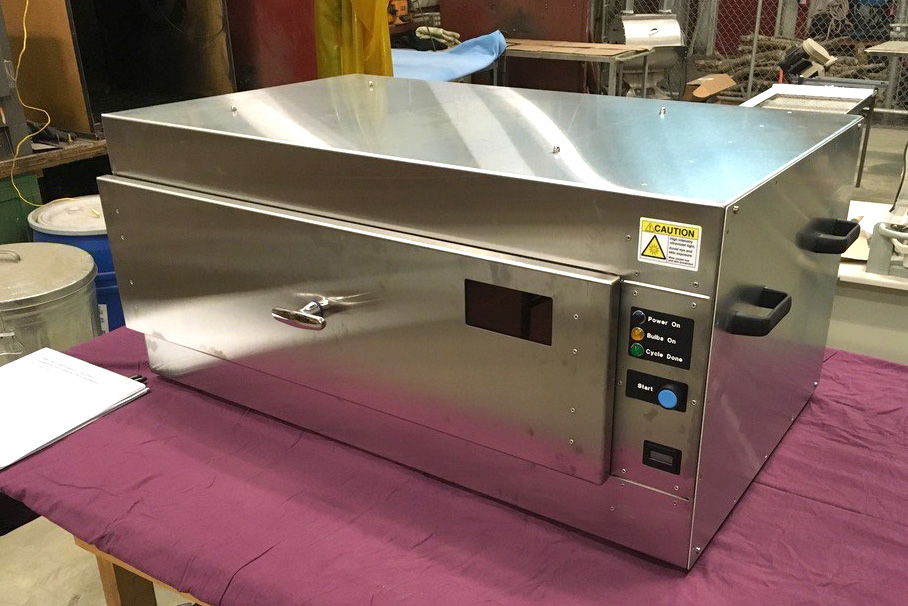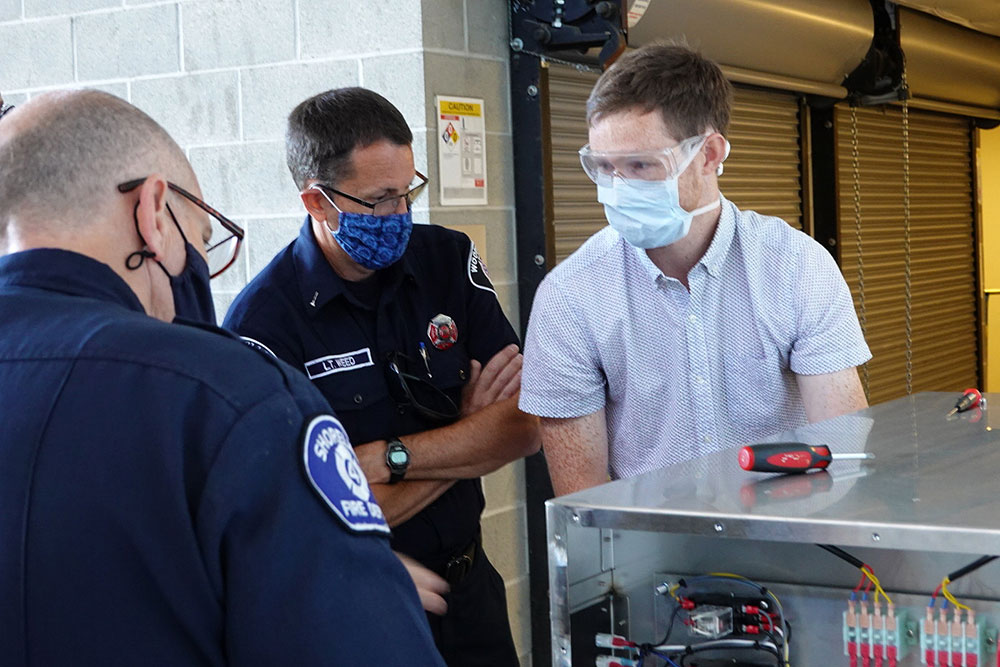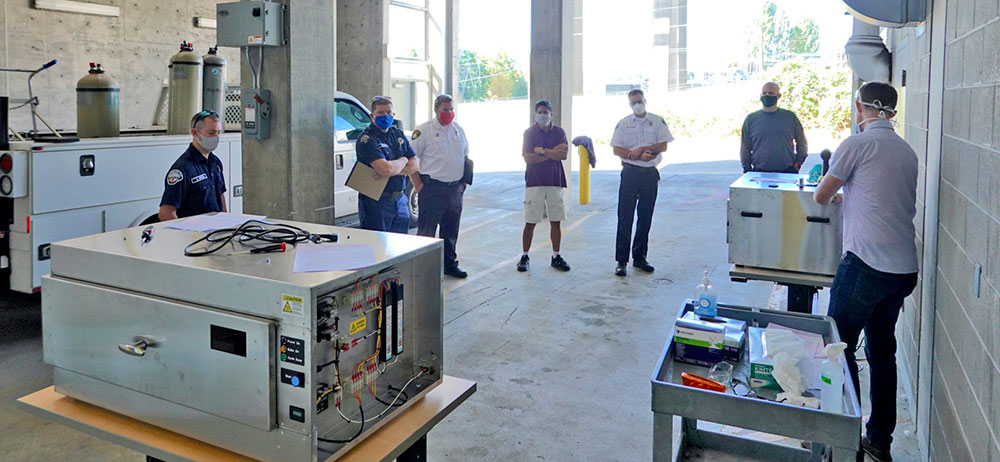Andy Freeberg
September 2, 2020

A regional partnership designed and built portable, easy-to-use boxes to allow first-responders to decontaminate their N95 face masks between uses. Photo courtesy of Engineering Innovation in Health
Thanks to a unique and innovative Washington partnership, first responders have a new tool for the pandemic. Stations across the region have begun receiving University of Washington-designed, locally manufactured systems to decontaminate the high-demand face masks needed to protect them from COVID-19 while carrying out their essential duties.
The N95 respirator mask is one of the most important protections for keeping first responders, such emergency medical services (EMS) staff and firefighters, defended against COVID-19. Every trip made by these key personnel requires fresh, clean N95 masks, which means they either go through a lot of single-use masks or need equipment to decontaminate the masks for re-use.
Through the UW’s Engineering Innovation in Health (EIH) program, researchers formed a partnership with King County Public Health and regional first responders, manufacturers and charitable foundations, including the Medic One Foundation, UW Population Health Initiative and Medtronic Foundation, on an urgent project to engineer custom-built N95 mask decontamination boxes.
“This is a collaboration where groups from around the region stepped up to recognize a community need and provide a solution,” says Dave Van Valkenburg, a deputy chief for the Kirkland Fire Department. “This will go a long way toward ensuring firefighters, paramedics and ambulance crews across the state have a secure supply of critical protective equipment.”

The UW-designed UVC decontamination boxes can decontaminate 15 standard N95 masks in 30 minutes. Photo courtesy of Engineering Innovation in Health
Using a technique known as ultraviolet germicidal irradiation (UVGI) that destroys viruses and microorganisms with ultraviolet (UVC) light, the UW team designed a plug-in N95 mask decontamination box. The boxes are roughly the size of a small refrigerator and allow essential staff at fire, police, maritime and EMS stations to quickly decontaminate their own masks.
“When we started this project there wasn’t anything commercially available that strictly does UVC decontamination of N95 masks and could be distributed to individual fire stations,” notes Jonathan Posner, professor of mechanical engineering and chemical engineering and director of EIH. “There are boxes that generate UVC for general decontamination, but treating N95 masks specifically for COVID-19 is a unique challenge. It requires an effective dosage distributed evenly to all surfaces of a set of masks.”
The project began back in late March when Betty Yang, a UW emergency medical physician who had collaborated with EIH in the past, made an introduction between between Posner and Dennis Dahline, a deputy chief for the Seattle Fire Department. Dahline had been tasked with looking into strategies to ensure stations remained stocked with N95s and one option was to bring collections of them to the decontamination facilities at UW Medicine.
The initial team soon expanded to include stakeholders from Kirkland Fire and King County EMS and began work on a distributed solution: plug-in boxes that would allow each station to do their own decontamination. The boxes had to be small, fast, easy to use and effective against COVID-19. Posner quickly assembled a team of engineers to tackle the design.

ME doctoral student Ben Sullivan (right) teaches two fire officials how to use the COVID-19 decontamination boxes he helped develop. Photo courtesy of Engineering Innovation in Health
One of those engineers is mechanical engineering doctoral student Ben Sullivan. “Research at UW had really ground to a halt when this opportunity came up to make a tangible impact,” says Sullivan. “It turned out to be a constrained design process because at first it was a challenge just to source the materials with everyone scrambling to get them.”
The team designed the boxes around 36-inch UVC bulbs because they were the most available, taking care to ensure the bulbs apply the critical dose of UV to all surfaces of a mask by adding reflectors and a nearly transparent tray. The result is a device that weighs about 100 pounds, holds up to 15 masks at a time, and decontaminates the masks in a half-hour. A UV-sensitive card added to each cleaning cycle confirms that the box has done its job.
The first boxes have already been manufactured by Vashon Island’s Meadow Creature and Burn Design Lab and distributed to fire and EMS stations in Enumclaw, Palmer, Snoqualmie and Fall City. The team hopes to build and distribute approximately 100 boxes and could manufacture more later if needed.

First responders at a training for the new UVC decontamination boxes. Around 100 of the boxes (foreground left) are being locally manufactured and distributed throughout the state. Photo courtesy of Engineering Innovation in Health
“One of the most impressive parts about the project is its truly local and collaborative nature,” notes Posner. “Many of the people involved volunteered their own personal time and resources and we truly couldn’t have done it without each and every one of them, especially the organizations who stepped up to fund the project.”
“This is a challenging time for all of our first responders, who are working harder than ever, fully dedicated to providing the emergency services needed in our community right now. With the potential of another wave of COVID-19 infections, as well as expected flu infections this fall, it’s important that we do whatever is necessary to keep our first responders safe and healthy,“ says Brooks Simpson, chairman of the board of the Medic One Foundation.
Learn more
For questions about this project, contact UW’s Engineering Innovation in Health.
Read more about how UW researchers are responding to novel coronavirus (COVID-19)